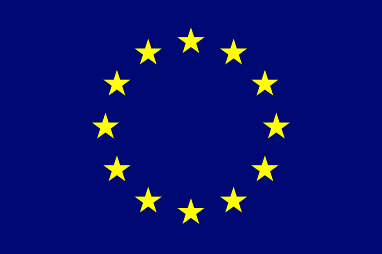Publications
Throughout the year, VOICE produces and disseminates key documents reflecting on humanitarian aid issues at the EU level and from an NGO perspective. They are addressed to decision-makers within the European institutions, at the National level, to NGO networks and other stakeholders of the humanitarian community, as well as to the VOICE members. Some documents are produced by the VOICE Secretariat with the support of VOICE members while others are publications from members and other key stakeholders in the humanitarian sector.
Please note that members-only documents will not be visible unless you are logged in.
-

Summary report of the European Humanitarian Forum pre-event on localisation
21 March 2022This paper shares discussion points highlighted during the pre-event, attended by over 60 colleagues from about 47 INGOs and national NGOs from countries as diverse as Yemen, Nigeria, Indonesia, Lebanon, and Uganda organised by VOICE and Charter4Change. -

NGO joint statement on the impact of counterterrorism measures and sanctions on humanitarian action
17 March 2022Members' publicationsAhead of the upcoming European Humanitarian Forum (EHF) from the 21 to the 23 of March, 49 NGOs, including VOICE members, and 7 networks of NGOs call on clear commitments from the EU and its Member States to prevent restrictive measures’ unintended consequences, especially on organisations’ capacity to reach people in need. -
VOICE statement ahead of the European Humanitarian Forum 2022
14 March 2022In the statement, VOICE calls on the EU and its MS to use the European Humanitarian Forum as an opportunity to:
• Recommit and further strengthen their commitment to principled humanitarian aid
• Review and adjust the approach of the EU towards counterterrorism and restrictive measures
• Strengthen collective efforts to achieve the Grand Bargain (GB) 2.0 commitments
• Confirm commitments to the effective implementation of humanitarian protection and IHL
• Set up clear and measurable commitments to build climate resilience and adjust financial support and policies on greening humanitarian aid
• Review progress on and recommit to the inclusion of gender considerations into humanitarian action and policies.
-
Follow up-report to the Communication on the EU’s humanitarian action: new challenges, same principles
08 March 2022COMMISSION STAFF WORKING DOCUMENT on the follow-up of the Communication on the EU’s Humanitarian Action: new challenges, same principles (4 March 2022). -

Joint I/NGO statement on humanitarian protection and access in Ukraine
07 March 2022Members' publicationsJoint statement by national and international humanitarian organisations on Ukraine.
-
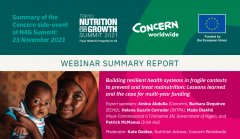
Concern's Webinar Summary Report - Building Resilient Health Systems and the Case for Multiyear Funding
24 February 2022Members' publicationsSummary report of the webinar on Building Resilient Health Systems and the Case for Multiyear Funding held by Concern Worldwide as part of the Nutrition for Growth Summit -
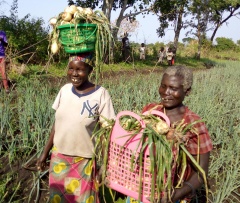
Co ordinated, multi- annual, flexible, and programmatic funding : A Perspective from Germany
23 February 2022VOICE out loudThe article by Malteser International explains how integrating humanitarian, transitional, and development funding is essential to building the Humanitarian- Development -Peace -Nexus approach.
-
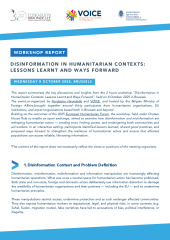
-
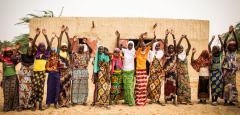
The Danish Approach to Nexus
17 February 2022VOICE out loudIn this VOICE out loud article DanChurchAid and Danish Refugee Council analyse the Danish approach to the humanitarian- development-peace nexus. -
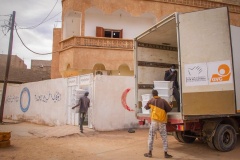
We World - Operationalisation of the Triple Nexus
11 February 2022VOICE out loudThis VOICE out loud article from our member We World describes how Italy is implementing the humanitarian-development-peace nexus approach.
-
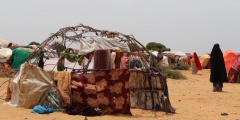
NRC- 50 NGOs call for urgent humanitarian support to Somalia's drought crisis
10 February 2022NRC has joined 50 Somali and international NGOs in issuing an open letter to donor nations and the international community regarding the deteriorating drought situation in Somalia. The letter highlights the urgent need for humanitarian assistance, and calls on donor nations to fund the UN humanitarian appeal - which remains 98% underfunded. -
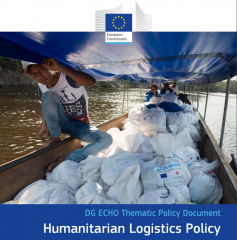
DG ECHO Humanitarian Logistics Policy
09 February 2022DG ECHO thematic policy document: Humanitarian Logistics Policy -

Yemen: Rise in airstrikes and landmines add to misery for civilians in Marib after year of increased conflict
09 February 2022Members' publicationsOne year after the battle for Yemen’s resource-rich Marib governorate escalated, the humanitarian situation has worsened as shifting frontlines, airstrikes and landmines displace nearly 100,000 people, many of whom have already fled multiple times. -
IRC- The top 10 crises the world can't ignore in 2022
08 February 2022Members' publicationsThe International Rescue Committee (IRC) has released its 2022 Emergency Watchlist, a global list of humanitarian crises that are expected to deteriorate the most over the coming year. -

At least three children dead and thousands without homes, schools after Cyclone Batsirai hit Madagascar
08 February 2022Members' publicationsThree children have died, tens of thousands lost their homes, and up to 10,000 left with no school to attend this week after Cyclone Batsirai tore through Madagascar at the weekend, Save the Children said today. -

YEMEN - Mass casualty attacks leave dozens dead and nation blacked out for days
27 January 2022Members' publicationsOn Friday, January 21, a series of attacks across Yemen claimed hundreds of casualties, of which 91 people were killed in a mass casualty airstrike on a detention facility in Sa’ada, the most deadly event recorded in more than two years. -

Humanity and Inclusion is committed to reducing its carbon footprint
26 January 2022Members' publicationsHumanity and Inclusion (HI) is committed to reducing its carbon footprint. HI and nine other NGOs have created the CHANGE consortium. The aim is to set up standards to measure and reduce their greenhouse gas emissions. Through this agreement, Humanity and Inclusion formally commits to:
- measure the impact of its actions on the environment and its greenhouse gas emissions;
- reduce its carbon footprint;
- adapt its humanitarian action to meet climate-related challenges;
- communicate on the progress made and the actions undertaken;
- encourage others to do the same. -
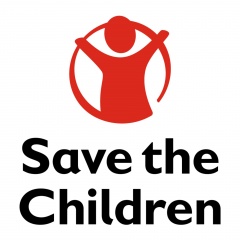
Parents and teachers race to clear ash from schools wrecked by Tonga volcano
26 January 2022Members' publications -
Finance in Displacement - Joint Lessons Report. IRC
25 January 2022Members' publicationsBetween 2019 and 2021, the IRC partnered with Catholic University Eichstaett-Ingolstadt and Tufts University for the Finance in Displacement (FIND) research project, which interviewed over 280 forcibly displaced persons (FDPs) in Jordan, Kenya, Uganda and Mexico. The final report brings to light the challenges FDPs face in accessing economic opportunities and puts forth a financial health framework for measuring progress against these challenges. -

(FPA) Watch Group meeting minutes - 15.11.2021
20 January 2022FPA Watch GroupMinutes of the (FPA) Watch Group meeting (15 November 2021) -
Accelerating Action for Rural Sanitation – Challenges and Recommendations
18 January 2022Members' publicationsAccess to sanitation is a human right and the States have re-committed themselves to ensure universal access to sanitation with the adoption of the Sustainable Development Goal n°6. Unfortunately, rural sanitation is still not a priority for governments. Secours Islamique France (SIF) presents its study and conclusions aimed at promoting sanitation in rural areas, so that no one would be left behind. -
The Most Under-Reported Humanitarian Crises of 2021
14 January 2022Members' publicationsIn collaboration with the media monitoring service Meltwater, CARE analysed the humanitarian crises that received the least media attention in 2021. the Report aims to help aid organisations, the media, policymakers and affected communities discuss how to better raise awareness and increase support for people in need around the world. -

Statement from Humanitarian Organizations in Myanmar on Escalating Violence
06 January 202214 humanitarian organizations working in Myanmar stand in solidarity with Save the Children and the other victims after the attack on civilians and aid workers reportedly perpetrated by military forces on 24 December, which led to the deaths of two aid workers, staff members of Save the Children. -
VOICE out loud 32 - The EU Member States’ implementation of the humanitarian-development-peace nexus
21 December 2021VOICE out loudThis new issue of the VOL focuses on how EU Member States are interpreting and implementing the triple nexus according to our members' perspective.
VOICE members based in Denmark, Finland, Germany, Italy and Sweden have been asked to share their views on how their respective governments are approaching the implementation of nexus Programmes and how these approaches are supporting their work at field level. The issue features also an interview with EPLO and an article from ACBAR, the Afghanistan NGOs Network. -

12,000 pushbacks in 2021 reflects worrying normalization of illegal practice
21 December 2021Members' publications

